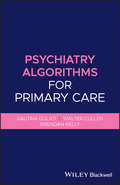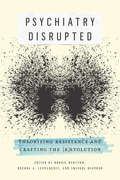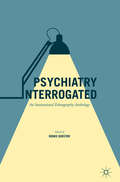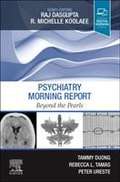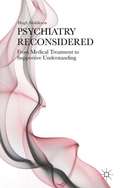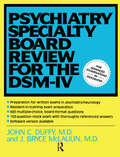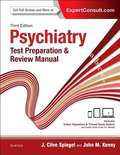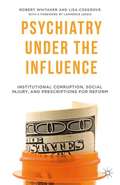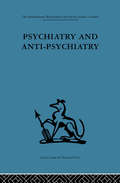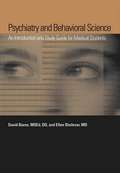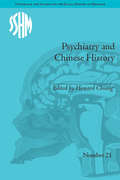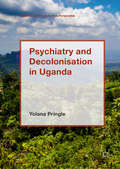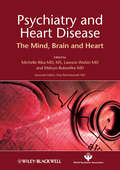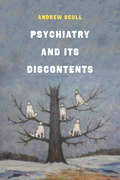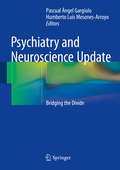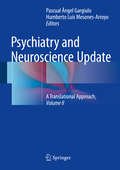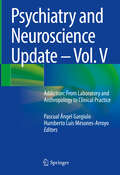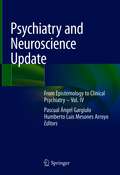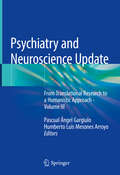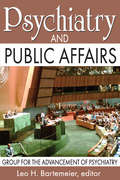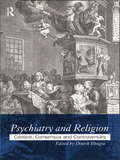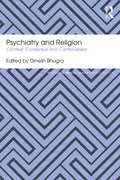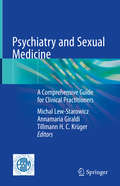- Table View
- List View
Psychiatry Algorithms for Primary Care
by Gautam Gulati Brendan Kelly Walter CullenPsychiatry Algorithms for Primary Care is a practical, quick reference guide to psychiatric assessment and mental healthcare in general practice. Providing algorithms informed by evidence-based guidelines, this easy-to-use resource helps busy medical and healthcare professionals quickly assess mental health problems, make informed treatment decisions, and understand when referrals to specialist mental health services are appropriate. Drawing from their extensive experience in general practice and psychiatry, the authors provide clear and authoritative guidance on a wide range of common psychiatric disorders, complex scenarios, and special considerations. Unique visual management algorithms define assessment, diagnosis, investigations and management for each condition, including Bipolar Affective Disorder, Psychosis, Depression, Dementia, and Attention Deficit Hyperactivity Disorder. Up-to-date information on medication choices and counselling strategies is found throughout the text. Designed for informing swift clinical decisions in demanding primary care settings, this indispensable reference guide: Conforms to the diagnostic criteria in the current edition of the World Health Organization’s International Classification of Diseases Contains algorithms informed by the Royal College of General Practitioners (RCGP), Royal College of Psychiatrists (RCPsych), and the National Institute for Health and Care Excellence (NICE) guidelines Explores common complaints that can suggest psychological or psychiatric disorders, such as insomnia and fatigue Outlines special mental health considerations related to children, intellectual disability, autism, the elderly, and pregnancy Includes appendices covering commonly prescribed drugs and physical examinations for patients with severe mental illness Features numerous self-assessment questions and links to online reference tools for General Practitioners
Psychiatry Disrupted
by Shaindl Diamond Bonnie Burstow Brenda A. LefrançoisThere is growing international resistance to the oppressiveness of psychiatry. While previous studies have critiqued psychiatry, Psychiatry Disrupted goes beyond theorizing what is wrong with it to theorizing how we might stop it. Introducing readers to the arguments and rationale for opposing psychiatry, the book combines perspectives from anti-psychiatry and critical psychiatry activism, mad activism, antiracist, critical, and radical disability studies, as well as feminist, Marxist, and anarchist thought. The editors and contributors are activists and academics - adult education and social work professors, psychologists, prominent leaders in the psychiatric survivor movement, and artists - from across Canada, England, and the United States. From chapters discussing feminist opposition to the medicalization of human experience, to the links between psychiatry and neo-liberalism, to internal tensions within the various movements and different identities from which people organize, the collection theorizes psychiatry while contributing to a range of scholarship and presenting a comprehensive overview of resistance to psychiatry in the academy and in the community. Contributors include Simon Adam (University of Toronto), Rosemary Barnes University of Toronto, Peter Beresford (Brunel University), Bonnie Burstow (University of Toronto), Chris Chapman (York University), Mark Cresswell (Durham University), Shaindl Diamond (York University), Chava Finkler (Memorial University), Ambrose Kirby (therapist in private practice, Brenda A. LeFrançois (Memorial University of Newfoundland), Mick McKeown (University of Central Lancashire), Robert Menzies (Simon Fraser University), China Mills (Oxford University), Tina Minkowitz (World Network of Users and Survivors of Psychiatry), Ian Parker (University of Leicester), Susan Schellenberg, Helen Spandler (University of Central Lancashire), and AJ Withers (York University). A courageous anthology, Psychiatry Disrupted is a timely work that asks compelling activist questions that no other book in the field touches.
Psychiatry Disrupted: Theorizing Resistance and Crafting the (R)evolution
by Shaindl Diamond Bonnie Burstow Brenda A. LeFrançoisThere is growing international resistance to the oppressiveness of psychiatry. While previous studies have critiqued psychiatry, Psychiatry Disrupted goes beyond theorizing what is wrong with it to theorizing how we might stop it. Introducing readers to the arguments and rationale for opposing psychiatry, the book combines perspectives from anti-psychiatry and critical psychiatry activism, mad activism, antiracist, critical, and radical disability studies, as well as feminist, Marxist, and anarchist thought. The editors and contributors are activists and academics - adult education and social work professors, psychologists, prominent leaders in the psychiatric survivor movement, and artists - from across Canada, England, and the United States. From chapters discussing feminist opposition to the medicalization of human experience, to the links between psychiatry and neo-liberalism, to internal tensions within the various movements and different identities from which people organize, the collection theorizes psychiatry while contributing to a range of scholarship and presenting a comprehensive overview of resistance to psychiatry in the academy and in the community. Contributors include Simon Adam (University of Toronto), Rosemary Barnes University of Toronto, Peter Beresford (Brunel University), Bonnie Burstow (University of Toronto), Chris Chapman (York University), Mark Cresswell (Durham University), Shaindl Diamond (York University), Chava Finkler (Memorial University), Ambrose Kirby (therapist in private practice, Brenda A. LeFrançois (Memorial University of Newfoundland), Mick McKeown (University of Central Lancashire), Robert Menzies (Simon Fraser University), China Mills (Oxford University), Tina Minkowitz (World Network of Users and Survivors of Psychiatry), Ian Parker (University of Leicester), Susan Schellenberg, Helen Spandler (University of Central Lancashire), and AJ Withers (York University). A courageous anthology, Psychiatry Disrupted is a timely work that asks compelling activist questions that no other book in the field touches.
Psychiatry Interrogated
by Bonnie BurstowThis edited volume is an anthology of institutional ethnography (IE) inquiries into psychiatry--the first ever to be written. It focuses on a large variety of different geographic locations and constitutes a major contribution to anti/critical psychiatry, as well as institutional ethnography. Themes include the DSM, the use and protection of problematic psychiatric research, the penetration of psychiatry into the workplace. Adding depth and breath, the contributors, while all are schooled in IE, come from a large variety of walks of life, authors including: academics, psychiatric survivors, investigative reporters, activists, nurses, artists, and lawyers--each bringing their own unique expertise/standpoint to bear. The result is an intellectually rigorous book, contributions to several disciplines, ammunition for activism, and a compelling read that cannot be put down.
Psychiatry Interrogated: An Institutional Ethnography Anthology
by Bonnie BurstowThis edited volume is an anthology of institutional ethnography (IE) inquiries into psychiatry—the first ever to be written. It focuses on a large variety of different geographic locations and constitutes a major contribution to anti/critical psychiatry, as well as institutional ethnography. Themes include the DSM, the use and protection of problematic psychiatric research, the penetration of psychiatry into the workplace. Adding depth and breath, the contributors, while all are schooled in IE, come from a large variety of walks of life, authors including: academics, psychiatric survivors, investigative reporters, activists, nurses, artists, and lawyers—each bringing their own unique expertise/standpoint to bear. The result is an intellectually rigorous book, contributions to several disciplines, ammunition for activism, and a compelling read that cannot be put down.
Psychiatry Morning Report: Beyond the Pearls (Morning Report)
by Tammy Duong Rebecca L. Tamas Peter UrestePsychiatry Morning Report: Beyond the Pearls is a case-based reference that covers the key material included on the USMLE Step 2 and Step 3, as well as the psychiatry clerkship. Focusing on the practical information you need to know, it teaches how to analyze a clinical vignette in the style of a morning report conference, sharpening your clinical decision-making skills and helping you formulate an evidence-based approach to realistic patient scenarios. Each case has been carefully chosen and covers scenarios and questions frequently encountered on the USMLE/psychiatry boards, shelf exams, and clinical practice, integrating both basic science and clinical pearls. Introductory chapters discuss practical psychiatry skills for daily functioning including taking a history, presenting and writing a note, briefly reviewing psychopharmacology, and ethical considerations.
Psychiatry Reconsidered
by Hugh MiddletonPsychiatry suffers a lot of criticism, not least from within its own scientifically founded medical world. This book provides an account of mental health difficulties and how they are generally addressed in conventional medical circles, alongside critical reviews of the assumptions underpinning them to encourage more humanitarian perspectives.
Psychiatry Specialty Board Review For The DSM-IV (Continuing Education in Psychiatry and Psychology Series #5)
by John Duffy J. Bryce McLaulinFirst published in 1996. Routledge is an imprint of Taylor & Francis, an informa company.
Psychiatry Test Preparation And Review Manual
by J. Clive Spiegel John M. KennyCovering every area of the ABPN board exam, the 3rd Edition of Psychiatry Test Preparation and Review Manual, by Drs. J. Clive Spiegel and John M. Kenny, includes 1,100 questions, video vignettes, and an online timed assessment to prepare you for certification or recertification success. You'll know exactly what to expect when exam day arrives, thanks to current coverage of the latest research in both psychiatry and neurology, as well as a format that precisely mimics all aspects of the written exam. Features six tests of 150 multiple-choice questions each, as well as 160 multiple-choice questions related to case vignettes. Allows you to see results broken down by topic online, so you can target areas needing further study. Bookmarking and score archiving are also available online. Allows you to exclude topics which are not included on the MOC, such as neuroscience and neurology, so you can more narrowly focus your study. Gives clear explanations for both insufficient/incorrect and correct answers, and provides recommended readings from key textbooks. Reflects the latest research and clinical practice in both psychiatry and neurology.
Psychiatry Under the Influence
by Robert Whitaker Lisa CosgrovePsychiatry Under the Influence investigates how the influence of pharmaceutical money and guild interests has corrupted the behavior of the American Psychiatric Association and academic psychiatry during the past 35 years. The book documents how the psychiatric establishment regularly misled the American public about what was known about the biology of mental disorders, the validity of psychiatric diagnoses, and the safety and efficacy of its drugs. It also looks at how these two corruptinginfluences encouraged the expansion of diagnostic boundaries and the creation of biased clinical practice guidelines. This corruption has led to significant social injury, and in particular, a societal lack of informed consent regarding the use of psychiatric drugs, and the pathologizing of normal behaviors in children and adults. The authors argues that reforming psychiatry will require the neutralization of these two corrupting influences—pharmaceutical money and guild interests—and the establishment of multidisciplinary authority over the field of mental health.
Psychiatry and Anti-Psychiatry
by David CooperTavistock Press was established as a co-operative venture between the Tavistock Institute and Routledge & Kegan Paul (RKP) in the 1950s to produce a series of major contributions across the social sciences. This volume is part of a 2001 reissue of a selection of those important works which have since gone out of print, or are difficult to locate. Published by Routledge, 112 volumes in total are being brought together under the name The International Behavioural and Social Sciences Library: Classics from the Tavistock Press. Reproduced here in facsimile, this volume was originally published in 1967 and is available individually. The collection is also available in a number of themed mini-sets of between 5 and 13 volumes, or as a complete collection.
Psychiatry and Behavioral Science: An Introduction and Study Guide for Medical Students
by David Baron Ellen H. SholevarThis easy-to-read, unique format text combines introductory psychiatry content with board-style review questions written for first and second year medical students. The book is intended to be used as the required text for pre-clinical psychiatric education. The user-friendly split page format includes clinical vignettes, "fun facts," and relevant art work. Each chapter contains board review questions that prepare the medical student for USMLE Step 1 and COMLEX 1. By using a clinical approach consistent with the needs of today's medical students, the authors hope to prepare first and second year medical students for their exams and clinical rotations.
Psychiatry and Chinese History (Studies for the Society for the Social History of Medicine #21)
by Howard ChiangThis collection examines psychiatric medicine in China across the early modern and modern periods. Essays focus on the diagnosis, treatment and cultural implications of madness and mental illness and explore the complex trajectory of the medicalization of the mind in shifting political contexts of Chinese history.
Psychiatry and Decolonisation in Uganda (Mental Health in Historical Perspective)
by Yolana PringleThis open access book investigates psychiatry in Uganda during the years of decolonisation. It examines the challenges facing a new generation of psychiatrists as they took over responsibility for psychiatry at the end of empire, and explores the ways psychiatric practices were tied to shifting political and development priorities, periods of instability, and a broader context of transnational and international exchange. At its heart is a question that has concerned psychiatrists globally since the mid-twentieth century: how to bridge the social and cultural gap between psychiatry and its patients? Bringing together archival research with oral histories, Yolana Pringle traces how this question came to dominate both national and international discussions on mental health care reform, including at the World Health Organization, and helped spur a culture of experimentation and creativity globally. As Pringle shows, however, the history of psychiatry during the years of decolonisation remained one of marginality, and ultimately, in the context of war and violence, the decolonisation of psychiatry was incomplete.
Psychiatry and Heart Disease
by Michelle Riba Lawson Wulsin Divy Ravindranath Melvyn RubenfireThis unique book will help psychiatrists to understand better the risks of cardiovascular illness and cardiologists to appreciate possible pathophysiological links with psychiatric conditions. It describes the common psychiatric conditions, their key features and how they may influence cardiovascular disease, outcomes, and quality of life. It also considers the cardiovascular complications that may arise as a result of mental illness. In an exciting, collaborative approach, psychiatrists and cardiologists combine their expertise throughout the book to provide guidance on the best way to manage such patients, considering the patient as a whole, not the individual conditions.
Psychiatry and Its Discontents
by Andrew ScullWritten by one of the world’s most distinguished historians of psychiatry, Psychiatry and Its Discontents provides a wide-ranging and critical perspective on the profession that dominates the treatment of mental illness. Andrew Scull traces the rise of the field, the midcentury hegemony of psychoanalytic methods, and the paradigm’s decline with the ascendance of biological and pharmaceutical approaches to mental illness. The book’s historical sweep is broad, ranging from the age of the asylum to the rise of psychopharmacology and the dubious triumphs of “community care.” The essays in Psychiatry and Its Discontents provide a vivid and compelling portrait of the recurring crises of legitimacy experienced by “mad-doctors,” as psychiatrists were once called, and illustrates the impact of psychiatry’s ideas and interventions on the lives of those afflicted with mental illness.
Psychiatry and Neuroscience Update
by Pascual Ángel Gargiulo Humberto Luis Mesones ArroyoThe intention of this unique title is to bridge the gap between psychiatry and neuroscience, allowing a fruitful dialogue between both sciences. Recognizing that psychiatry has received important contributions from the basic neurosciences and that the basic neurosciences have received inspiration and objectives from the open problems of psychiatry, Psychiatry and Neuroscience: Bridging the Divide is designed to identify the borders, trends and implications in both fields today. Comprehensive and developed by a renowned group of experts from both fields, the book is divided into four parts: Epistemological Considerations About the Study of Normal and Abnormal Human Behaviors; From Basic Neurosciences to Human Brain; Neurosciences, Learning, Teaching and the Role of Social Environment and Explaining Human Pathological Behaviors: From Brain Disorders to Psychopathology. A unique and invaluable addition to the literature in psychiatry and neuroscience, Psychiatry and Neuroscience: Bridging the Divide offers an important and clearer understanding of the relationship between psychiatry and neuroscience.
Psychiatry and Neuroscience Update - Vol. II
by Pascual Ángel Gargiulo Humberto Luis Mesones-ArroyoThe aim of this unique book is to provide an overview of recent advances bridging the gap between psychiatry and neuroscience, allowing a fruitful dialogue between both sciences. The emerging interactions and mutual contributions between neuroscience and psychiatry are here recognized. This book is designed to identify the borders, trends and implications in both fields today. Comprehensive and developed by a renowned group of experts from both fields, the book is divided into four parts: Epistemological Considerations About the Study of Normal and Abnormal Human Behaviors; From Basic Neurosciences to Human Brain; Neurosciences, Learning, Teaching and the Role of Social Environment; and Explaining Human Pathological Behaviors: From Brain Disorders to Psychopathology. A unique and invaluable addition to the literature in psychiatry and neuroscience, Psychiatry and Neuroscience Update - Vol. II: A Translational Approach offers an important and clearer understanding of the relationship between these two disciplines. This book is directed to students, professionals and researchers of medicine, psychology, psychopedagogy and nursery.
Psychiatry and Neuroscience Update – Vol. V: Addiction: From Laboratory and Anthropology to Clinical Practice
by Pascual Ángel Gargiulo Humberto Luis Mesones-ArroyoThis book offers a multidisciplinary approach to the phenomenon of addiction, including a discussion of its anthropological, neurological, psychiatric and social aspects. The editors have maintained this multidisciplinary criterion since the first volume of the Psychiatry and Neuroscience Update collection. Approaching a topic from multiple points of view guides the mentality to open to biological and psychological relationships and facilitates translational extrapolations. The ability to establish relationships, closer or more distant, but always binding, is thus stimulated, whether for study, research or the interpretation of clinical reality. As in previous volumes, the book opens with a part dedicated to anthropological and philosophical aspects, thus ensuring the validity of the humanistic aspect. Intersubjectivity, epistemological reflections, the meaning of ecstasy, and philosophical reflection leading to therapy are explored. Part 2—From Basic Neurosciences to Human Brain—presents a set of basic investigations with high translational content. This corresponds with the editors’ intention to build bridges, here between the basic and the clinical, favoring the translational. Chapters present topics of interest to both fields, such as the neurobiology of addictions, cocaine, and benzodiazepines. Part 3 establishes links between neurosciences, learning, teaching, and the social environment. It begins with a chapter on executive functioning before discussing excessive use of computer technology and educational interventions for patients with alcohol addiction. The fourth part of the book attempts to explain pathological human behavior. It is about establishing links between brain disorders and diseases in the strict sense. Among other topics, chapters deal with cognitive dysfunction in addiction, neuroimaging, and stigma around substance use disorders. Psychiatry and Neuroscience Update: Addiction: From Laboratory and Anthropology to Clinical Practice – Vol. V was edited and authored by a multidisciplinary group of authors and will be vital for an equally multidisciplinary group of readers: psychiatrists, psychologists, neuroscientists, and any other clinician or researcher that is interested in addictions. Those in the humanities, particularly anthropologists and philosophers, will find the first part of great interest.
Psychiatry and Neuroscience Update: From Epistemology to Clinical Psychiatry – Vol. IV
by Pascual Ángel Gargiulo Humberto Luis Mesones ArroyoThis broad and thought-provoking volume provides an overview of recent intellectual and scientific advances that intersect psychiatry and neuroscience, offering a wide range of penetrating insights in both disciplines. The fourth volume on the topic in the last several years from a varying panel of international experts identifies the borders, trends and implications in both fields today and goes beyond that into related disciplines to seek out connections and influences. Similar to its three Update book predecessors, Psychiatry and Neuroscience – Volume IV presents a range of interesting topics in the main disciplines – psychiatry and neuroscience – and attempts to provide deeper comprehension or explication of the normal and diseased human mind, its biological correlates and its biographical and existential implications. This engaging volume continues the previous style of exploring different disciplines and trying to integrate disciplinary evidence from varying points of view in an organic manner. The first section is about epistemological considerations regarding the study of normal and abnormal human behaviors, including, for example, the topic of phenomenological psychopathology and phenomenological psychiatry in relation to schizophrenia and substance misuse, among other topics. Section 2 addresses issues around the translation of basic neuroscience to expression in the human brain and behavioral implications. Section 3 discusses the issues of learning, teaching and the role of social environment in the field of neuroscience. Finally section 4 reviews various perspectives on explaining human pathological behaviors -- from brain disorders to psychopathology.
Psychiatry and Neuroscience Update: From Translational Research to a Humanistic Approach - Volume III
by Pascual Ángel Gargiulo Humberto Luis Mesones ArroyoThis broad and thought-provoking volume provides an overview of recent intellectual and scientific advances that bridge the gap between psychiatry and neuroscience, offering a wide range of penetrating insights in both disciplines. The third volume on the topic in the last several years from a varying panel of international experts, this title identifies the borders, trends and implications in both fields today and goes beyond that into related disciplines to seek out connections and influences. Similar to its two Update book predecessors, Psychiatry and Neuroscience – Volume III presents the current state-of-the-art in the main disciplines – psychiatry and neuroscience – and attempts to provide deeper comprehension or explication of the normal and diseased human mind, its biological correlates and its biographical and existential implications. This engaging volume continues the previous style of exploring different disciplines and trying to integrate disciplinary evidence from varying points of view in an organic manner. Developed for clinicians and researchers in the fields of medicine, psychiatry, psychology and biology, this third volume also will be of great interest to students and university professors of diverse disciplines.
Psychiatry and Public Affairs: Group for the Advancement of Psychiatry
by Leo H. BartemeierThis stimulating collection bears witness to the insight that psychiatrists, with their special training and background and concern for human relationships, can contribute solutions to major problems of public affairs and public policy. The contributors represent the summation and distillation of the best thinking of psychiatry's leaders. They represent a variety of experiences and viewpoints, making possible a many-faceted approach to problems of national and international concern.Based on completely documented reports of individual members and symposium discussions, Psychiatry and Public Affairs examines four major areas of public interest: the social responsibility of psychiatry, emphasizing the psychiatric aspects of school desegregation; psychiatry's role in international relations and understanding cross-cultural communication and working abroad; studies of forceful indoctrination or "brainwashing" and the social and psychiatric implications of the threat of nuclear war.Contributors and contributions included here are "Physical and Social Isolation," Jack Vernon; "Psychiatric Aspects of Chinese Thought Reform," Robert J. Lifton; "Patterns of Reactions to Severe Chronic Stress in American Army POWs to the Chinese," Edgar H. Schein; "The Coming Struggle for More Responsibility," Pare Lorentz; "Some Implications of the Fall-Out Problem," Maurice B. Visscher; "Psychological Aspects of the Nuclear Arms Race," Franklin C. McLean; "Solitary Confinement," Milton Meltzer; and "Sleep Deprivation," David Tyler. Psychiatry and Public Affairs explores ideas and problems on the advancing edge of psychiatry.The Group for the Advancement of Psychiatry (GAP) envisages a continuing program of work according to the following aims: to collect and appraise significant data in the field of psychiatry, mental health, and human relations; to re-evaluate old concepts and to develop and test new ones; and to apply the knowledge thus obtained fo
Psychiatry and Religion: Context, Consensus and Controversies (Routledge Mental Health Classic Editions Ser.)
by Dinesh BhugraThe argument of this book is that the divide between psychiatry and religion is an artificial one and that there is much room for understanding the same phenomena from different perspectives. In it thirteen senior mental health professionals and pastoral workers come together to explore what their different philosophies have to offer each other for the benefit of the individuals in their care. The book as a whole: * sets the relationship between psychiatry and religion in historical context * provides detailed information about specific religions and the significance of their belief systems for mental health management * examines the relationship between psychopathology, psychiatry and religion.
Psychiatry and Religion: Context, Consensus and Controversies (Routledge Mental Health Classic Editions)
by Dinesh BhugraPsychiatry and Religion: Context, Consensus and Controversies works to eradicate the distinction between spiritual and psychological welfare and promote greater understanding of the relationship between the two. This book brings together chapters from fifteen mental health practitioners and pastoral workers to explore what their different philosophies have to offer the individuals in their care. As well as all the major world religions, the text also provides detailed information about newer religions and the significance of their belief systems for mental health management. The book examines the positive and negative effects that strict moral codes and religious rituals can produce and shows how awareness of these effects is crucial to the treatment of these patients. This classic edition of Psychiatry and Religion, with a new introduction from Dinesh Bhugra, will continue to provide an important resource to practicing and training psychiatrists.
Psychiatry and Sexual Medicine: A Comprehensive Guide for Clinical Practitioners
by Annamaria Giraldi Michal Lew-Starowicz Tillmann H. C. KrügerPsychiatry meets sexual medicine! This book explores the links between mental and sexual health and provides guidance for the treatment of the most common sexual problems. The book fills the need of many clinicians and trainees who work in the field of psychiatry and sexual medicine. Offering comprehensive and clearly structured information, case presentations, and key messages this book focuses on sharing essential knowledge and skills of recognized experts in the field. Get inspired by the vivid interactions of psychiatry and sexual medicine and help your patients on their way to improved sexual health!
